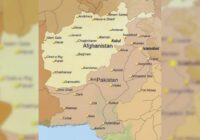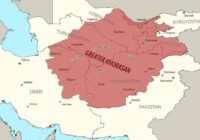When the Taliban seized power in Afghanistan in August 2021, the world watched in disbelief — and then, with troubling speed, looked away. Since then, Afghanistan has spiraled into a profound crisis characterized by political illegitimacy, resurging terrorism, economic freefall, gender apartheid and a worsening humanitarian emergency.
These challenges are deeply interconnected, creating a vortex of instability that not only endangers Afghanistan’s future but also threatens regional and global peace. Stabilizing the country will require more than isolated efforts or rhetorical condemnations; it demands a comprehensive international response, led by US leadership. Such an approach would strengthen regional security, restore America’s moral standing and reaffirm its leadership in peacemaking, aligning with US President Donald Trump’s focus on diplomacy over endless war.
This international effort would also uphold the foundational values of the United Nations Charter, including respect for sovereignty and the pursuit of peace through dialogue. When done correctly, this creates a rare alignment of interests and principles — a potential win for Afghans, regional powers and global unity.
The collapse and its drivers
Afghanistan’s current predicament stems from an extremist regime lacking political legitimacy. The Taliban rule by repression, not consent. Democratic institutions have been dismantled, civil society silenced and dissent punished. Internal divisions between the leadership in Kandahar and the Haqqani network further weaken prospects for inclusive governance. Terrorism has resurged under Taliban rule. A 2024 UN report confirms that al-Qaeda, ISIS-K and the Pakistani Taliban have significantly expanded in Afghanistan, with al-Qaeda establishing nine new terrorist camps that year. This tolerance or facilitation of terrorism provides a pretext for continued repression.
Economically, Afghanistan is in freefall. Since 2021, its economy has contracted nearly 30%, according to the World Bank. With increased dependence on foreign humanitarian aid, the Taliban have turned to illicit revenue sources such as drug trafficking, unregulated mining and smuggling. Although a nominal opium ban was imposed in 2022, production shifted to synthetic drugs like methamphetamine.
Meanwhile, over 90% of the population lives below the poverty line. Public services have collapsed, inflation is volatile and youth unemployment is rampant. With few options, many Afghans are fleeing — roughly 200,000 young people annually attempt to cross into neighboring countries. Families in rural areas often resort to selling children into labor or early marriage, and many young men are drawn into extremist groups, creating a cycle of poverty and radicalization.
Gender apartheid adds another layer of crisis. The Taliban have issued more than 80 decrees restricting women’s rights. Girls are banned from education beyond sixth grade; women are barred from most employment and public life. This exclusion has gutted vital public services once staffed by women. Mothers now send children to madrassas for food, exposing them to indoctrination and terrorist recruitment for operations at home and abroad. The suppression of women not only violates universal rights but also deprives the country of critical human capital, feeding into the larger crisis with far-reaching security implications.
These dynamics culminate in a massive humanitarian emergency. As of early 2024, nearly 70% of Afghans require humanitarian aid. Over 3 million Afghans are internally displaced, and about 6 million are refugees. However, aid alone cannot solve a crisis rooted in systemic collapse. Without political and economic reform, the situation will only deteriorate. Afghanistan’s collapse is a closed loop: repression fuels extremism, which erodes economic viability, deepening human suffering and increasing dependency. The Taliban will not reform themselves. Only meaningful external engagement — diplomatic and strategic — can disrupt this cycle.
Diplomatic opportunity and strategic leverage
Despite the Taliban’s firm grip, their regime is fragile, their economy untenable and their global standing nonexistent. This creates a diplomatic opening that the United States and regional actors must seize. Several developments make this moment an ideal time for action.
First, the Afghan people demand that the Taliban change and form an inclusive government consistent with Afghanistan’s international obligations. To that end, civic resistance in the country is ongoing and courageous. Women continue to protest, and underground schools for girls are growing. Youth activists, journalists and civil society leaders refuse to be silenced. This resilience underscores the population’s desire for inclusive governance and dignity.
Second, regional powers that once tolerated or supported the Taliban are now suffering the consequences. Pakistan faces increased terrorism from Tehrik-i-Taliban Pakistan (TTP) elements within Afghanistan. Iran is involved in border clashes and water disputes. China and Russia are stepping up intelligence operations to counter extremism. These countries now recognize that a failed Afghan state threatens them all.
Third, international actors are disillusioned with the Taliban’s refusal to reform. Diplomatic and humanitarian engagement has yielded deeper repression. As hope for internal moderation fades, external stakeholders are more receptive to new strategies.
Finally, armed resistance is emerging. In regions like Panjshir and northern Afghanistan, former security personnel and grassroots fighters are mounting a challenge to Taliban rule. Although fragmented, their presence signals political dissatisfaction and provides leverage in diplomacy. While peace must remain the primary goal, acknowledging this resistance adds pressure for negotiated solutions.
The United States has a critical opportunity to lead a values-driven strategy involving diplomacy, sanctions, regional cooperation and moral clarity. This does not mean military redeployment but a re-engagement on terms that reflect both American interests and Afghan needs.
A US-led framework for peace
The US should spearhead a United Nations-backed peace process, rooted in global interests and the harsh realities on the ground. Five key pillars can guide this effort.
First, a UN-led political process must be inclusive and Afghan-owned, involving the Taliban, opposition groups, women, civil society and ethnic minorities. The aim should be the formation of a transitional government supported by a multinational peacekeeping force. This body would undertake a constitutional review and lay the groundwork for lasting governance.
Second, the White House should appoint a Special Presidential Envoy for Afghanistan to coordinate diplomatic efforts. The US should also take the lead as Afghanistan’s penholder at the UN Security Council and support key recommendations from the 2023 UN Independent Assessment. Coordination between US and UN envoys would create a coherent strategy uniting donors and regional actors.
Third, the US must pursue faith-based diplomacy to counter the Taliban’s ideological legitimacy. Collaborating with Muslim-majority countries and institutions such as the Organization of Islamic Cooperation, the US can promote Islamic principles that support education, human rights and peace. Countries like Saudi Arabia, the UAE, and Qatar are well-positioned to challenge the Taliban’s theological justifications.
Fourth, the US should initiate a regional stability compact that brings together Pakistan, Iran, India, China, Russia and the Central Asian republics. This agreement would focus on non-interference, counterterrorism, refugee repatriation and regional connectivity. Afghanistan could then shift from a zone of competition to a platform for cooperation.
Finally, until a political settlement is reached, calibrated pressure and support for civil society must continue. Sanctions, visa bans, frozen assets and withholding diplomatic recognition should remain tools to penalize repression. However, phased incentives tied to concrete progress could encourage reforms. Crucially, civil society — especially women’s organizations and independent media — must receive robust international support to preserve democratic values under threat.
Why it matters for the United States
Reengaging in Afghanistan is not charity — it is a strategic and moral imperative aligned with America’s national interests. The future of Afghanistan intersects with national security, economic competitiveness, geopolitical influence and ethical credibility.
From a security standpoint, Afghanistan risks becoming a base for transnational terrorism. Al-Qaeda retains ties to the Taliban, and ISIS-K is expanding its reach. With diminished intelligence post-withdrawal, the threat is harder to monitor. To prevent future attacks, the US must rebuild partnerships and intelligence networks.
Economically, Afghanistan is estimated to possess $3 trillion in untapped minerals essential for clean energy and technology supply chains. Disengagement hands this opportunity to China. A transparent development framework would benefit both Afghan communities and US national security interests.
Geopolitically, Afghanistan is central to the region where great power competition plays out. A power vacuum benefits China, Russia and Iran. However, this same complexity allows the US to lead a cooperative agenda that fosters stability, infrastructure and shared prosperity.
Morally, the US has a legacy in Afghanistan. More than 2,400 American lives were lost, and over $2 trillion was spent in pursuit of a free and democratic society. Abandoning Afghanistan would not only betray those who believed in that vision but also damage America’s credibility. Leading a peace-focused strategy affirms US values and strengthens its global leadership.
A legacy of peace through leadership
America faces a defining moral and strategic choice: to retreat into the false comfort of disengagement or to lead with clarity, conviction and conscience. Indifference is not neutrality — it is complicity in the erosion of human rights, regional stability and US credibility. Geographic distance does not shield us from the consequences of instability abroad, especially when it endangers security at home.
Sustainable peace in Afghanistan is not merely a regional imperative — it is a national security priority. Disengagement risks the resurgence of transnational threats, while principled engagement through diplomacy, multilateral cooperation and sustained peacebuilding advances both American interests and global stability. This approach reflects the peace legacy President Trump has aspired to: ending endless wars through durable, negotiated solutions that preserve US values and strategic aims.
This is not about reliving past missteps but about preventing new ones through responsible and forward-looking leadership. True leadership means rallying others through example and shared purpose. Let history record that the United States chose to lead, not out of guilt, but out of duty, correcting the flawed choices made by successive administrations in pursuing a fragile peace and executing a premature withdrawal.
Peace does not happen by accident. It must be built — and it begins with a choice. Let us choose wisely.
[Kaitlyn Diana edited this piece]
The views expressed in this article are the author’s own and do not necessarily reflect Fair Observer’s editorial policy.
Support Fair Observer
We rely on your support for our independence, diversity and quality.
For more than 10 years, Fair Observer has been free, fair and independent. No billionaire owns us, no advertisers control us. We are a reader-supported nonprofit. Unlike many other publications, we keep our content free for readers regardless of where they live or whether they can afford to pay. We have no paywalls and no ads.
In the post-truth era of fake news, echo chambers and filter bubbles, we publish a plurality of perspectives from around the world. Anyone can publish with us, but everyone goes through a rigorous editorial process. So, you get fact-checked, well-reasoned content instead of noise.
We publish 3,000+ voices from 90+ countries. We also conduct education and training programs
on subjects ranging from digital media and journalism to writing and critical thinking. This
doesn’t come cheap. Servers, editors, trainers and web developers cost
money.
Please consider supporting us on a regular basis as a recurring donor or a
sustaining member.
Will you support FO’s journalism?
We rely on your support for our independence, diversity and quality.











Comment
Am I wrong in thinking the fifth point contradicts and even cancels the other four? I also find the suggestion that the “US should spearhead a United Nations-backed peace process, rooted in global interests and the harsh realities on the ground” to be surreal in the age of Biden and Trump, whose reluctance to defer to any “global interests” seems to me patent. Their wont has consistently been to deny the “harsh realities on the ground” and to hide behind either US exceptionalism (Biden) or America First (Trump), two ideologies incompatible with the evolution of the world (i.e. especially the global South).